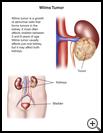
Wilms Tumor
________________________________________________________________________
KEY POINTS
- Wilms tumor is a growth of abnormal cells that forms tumors in the kidney in children between 3 and 8 years of age.
- The sooner cancer is found and treated, the better your child's chances for recovery. Treatment may include chemotherapy, radiation therapy, surgery, or a combination.
- Talk about your child’s cancer and treatment options with your child’s healthcare provider. Make sure you understand the treatment choices.
________________________________________________________________________
What is Wilms tumor?
Wilms tumor is a growth of abnormal cells that forms tumors in the kidney. It most often affects children between 3 and 8 years of age. Wilms tumor usually affects just one kidney, but rarely it may affect both kidneys either at the same time or one after the other.
The kidneys are located inside your body on each side of the spine, just above the waist. They filter waste out of the blood, control the balance of salt and water in your body, and make urine.
The sooner cancer is found and treated, the better your child's chances for recovery. However, even advanced cancer can usually be treated. Treatment may slow or stop the growth of the cancer and ease symptoms for a time. Ask your healthcare provider what you can expect with the type of cancer that your child has.
What is the cause?
The exact cause of this tumor is unknown. The tumor is linked with birth defects of the genitals, urinary tract, eyes, and other parts of your child's body. It tends to run in families and may be caused by changes in certain genes.
What are the symptoms?
Your child may appear healthy or may have:
- A lump that can be felt in the abdomen
- Blood in the urine
- Constipation
- Fever and night sweats
- Nausea or vomiting
- Loss of appetite
- Stomach pain
- Weight loss
Wilms tumors can grow quite large without causing pain.
How is it diagnosed?
Wilms tumor may be hard to diagnose. Sometimes tumors are found when X-rays are taken for other reasons. Your child's health care provider will ask about symptoms and examine your child. The provider will ask if there's a family history of cancer or birth defects of the genitals or urinary system.
Tests may include:
- Blood tests
- Urine tests
- Ultrasound, which uses sound waves to show pictures of the inside of the kidneys
- CT scan, which uses X-rays and a computer to show detailed pictures of the kidneys
- MRI, which uses a strong magnetic field and radio waves to show detailed pictures of the kidneys
- Arteriogram, which is a series of X-rays with contrast dye to look at arteries and veins of the kidneys
Your child may also have a chest X-ray or bone scan to find out if the cancer has spread beyond the kidneys.
How is it treated?
You and your healthcare provider will discuss possible treatments for your child. You may also talk with surgeon and a cancer specialist. Some things to think about when making treatment decisions are:
- Your child's age
- Your child's overall health
- The stage of the cancer (how advanced the cancer is)
- Whether the cancer has spread to other parts of your child's body
Possible treatments are:
- Chemotherapy (anticancer drugs), which uses medicine to kill cancer cells
- Radiation therapy, which uses high-energy X-rays to kill cancer cells
- Surgery to remove the tumor
Your child's treatment will also include:
- Preventing infections
- Controlling pain or other symptoms
- Preventing or controlling the side effects from treatments, which may be different for each person based on the treatment your child receives
- Helping your child and your family cope with cancer
Often, more than 1 type of treatment is used. Your child will need to have regular follow-up visits with his or her healthcare provider.
Ask your healthcare provider about clinical trials that might be available to your child. Clinical trials are research studies to find new cancer treatments. It’s always your choice whether your child takes part in one.
How can I take care of my child?
If your child has been diagnosed with Wilms tumor:
- Talk about your child’s cancer and treatment options with your child’s healthcare provider. Make sure you understand the treatment choices.
- Follow the full course of treatment prescribed by your child’s provider.
- Ask your child’s provider:
- How and when you will get your child’s test results
- How long it will take your child to recover
- If there are activities your child should avoid and when your child can return to normal activities
- How to take care of your child at home
- What symptoms or problems you should watch for and what to do if your child has them
- Make sure you know when your child should come back for a checkup.
It may also help if your child:
- Eats a variety of healthy foods
- Stays physically active as advised by your child’s healthcare provider
- Gets plenty of rest
- Takes time for activities that your child enjoys. It may help your child to talk with a counselor about the illness.
- Tells you or your provider if treatment causes discomfort. Usually there are ways to help your child be more comfortable.
For more information, contact:
- American Childhood Cancer Organization
855-858-2226
https://www.acco.org/ - American Cancer Society
800-227-2345
https://www.cancer.org/ - National Cancer Institute
800-422-6237
https://www.cancer.gov/
Last modified: 2020-01-06
Last reviewed: 2019-12-30

